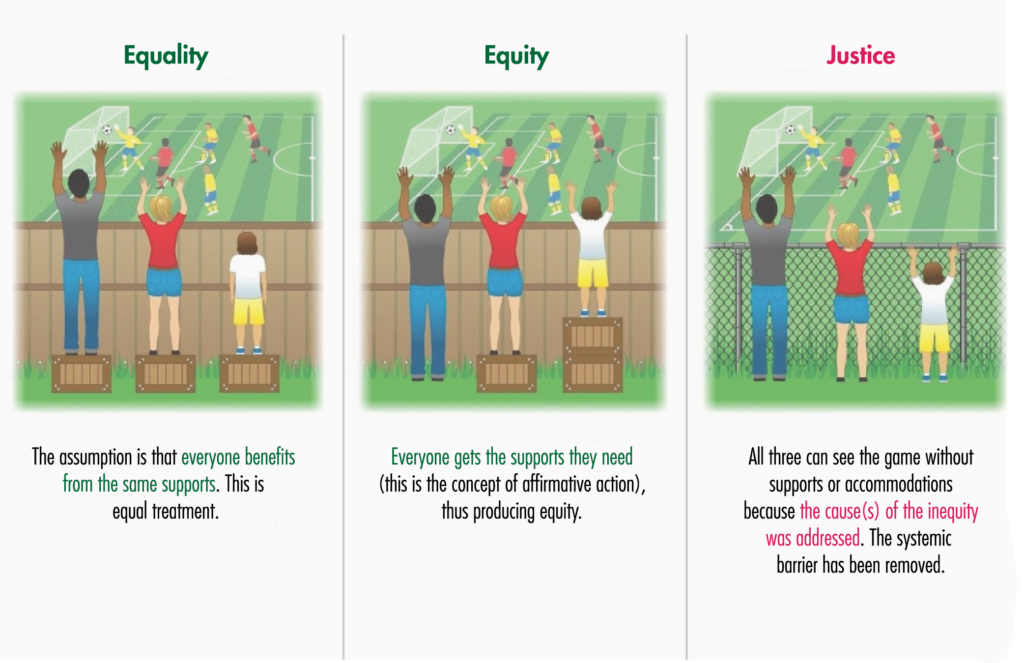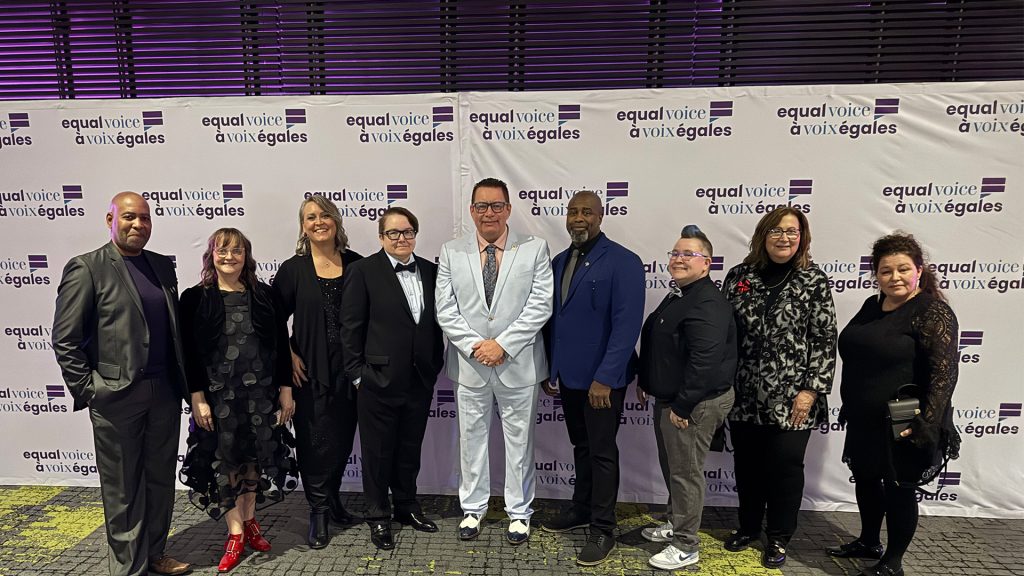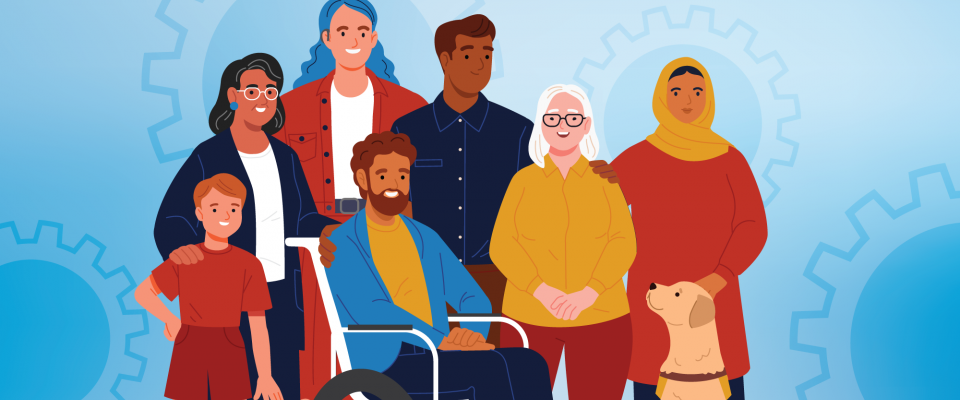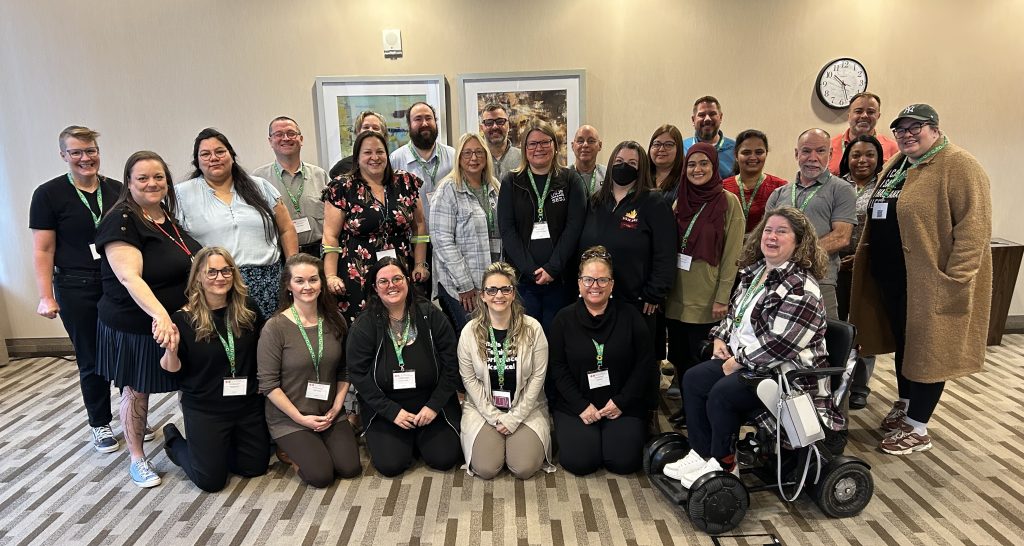National Equity Committee
The role of the National Equity Committee is to provide recommendations to the USJE National Executive in regards to:
- Ways the employer could better deal with equity issues in the workplace
- Ways that USJE could better deal with equity issues within USJE
If you would like to contact the USJE Equity Committee, please email us at: USJEEquity-EquiteSESJ@psac-afpc.com
Updates
USJE National Equity Committee Meets in Ottawa and Attends Equal Voice Gala in Support of More Women and Gender Diversity in Politics
PSAC demands real investments for inclusion and accessibility for workers with disabilities
USJE Representatives attend the PSAC Atlantic Access Summit in Halifax
Committee Members


Shauna Ward – Chair
Shauna Ward is the Regional Vice President CSC for the Prairies region. She has been the Chair of the Equity Committee since August 2023.
First elected to the position of RVP at the Triennial Convention in St-John’s in 2021, Shauna, along with National Vice-President Lynette Robinson, was instrumental in creating USJE’s first Equity Conference held in Winnipeg in February 2023.
Shauna started her career in Public Safety at the Women’s Jail at Portage la Prairie until 2009. She then worked at Stony Mountain Institution as a Correctional Officer and moved on to be an Indigenous Correctional Program Officer before transferring to Saskatchewan Penitentiary in Prince Albert.
Shauna continues to push forward USJE’s bold Equity agenda by being a tireless advocate for inclusion and consideration for all equity-deserving groups.
Shauna is a member of the Sandy Bay Ojibway First Nations. She is two-spirited and differently abled.


Kirk McIntosh – Vice-Chair
Kirk McIntosh is Regional Vice President for CSC Manitoba since July 2023. Prior to his election, Kirk had a long union record, having been a UCCO and a USJE shop steward, a local president, and a H&S officer.
His career at Correctional Services spans 24 years at Stony Mountain institution. He began as a Correctional Officer in the year 2000, before becoming a Social Programs Officer in 2012.
Kirk is the Vice-Chair of USJE’s Equity committee. His commitment is focused on maximizing decision making inclusion for all groups at every level. Kirk’s vision starts with the conviction that successful equity-enhancing practices within the workplace start within USJE. Born in Jamaica, Kirk came to Canada in 1974. He currently lives in Oakbank, Manitoba with his wife Teri-Lynn and their three girls, of which two are twins. He is the father to seven children with ages ranging from 32 to 2 ½ years old.

Joe Brathwaite
Joe Brathwaite has been active within USJE for some years. He has been at the forefront of political mobilization on behalf of USJE engaging with MP’s and Federal Ministers alike. His recent appointment to the USJE national Equity committee follows his delegate standing status at USJE’s first Equity Conference held in Winnipeg in 2023.
Joe Brathwaite is a long serving Greater Toronto Area community parole officer and Local #00079 executive member, serving as the Treasurer. He is a recipient of the 20-year Corrections Exemplary Service Award medal as well as the 2022 Queen’s Platinum Jubilee Community Service Pin and a member of CSC’s Black Employee network.
Joe has proactively engaged in discussions of national importance to issues affecting the security, cultural impact, and operations of the correctional/parole environment, as well as the safety of Correctional Service of Canada staff working with various public safety stakeholders. Joe is committed to fostering culture change within the corporate structures of USJE and the membership workplaces.
Joe was born and raised in Canada’s Old Capital, where he and his family of four currently reside.

Tracy Coates
Tracy Coates is the Local President for USJE Local 00060. Prior to this role, she was an active union member for many years.
Tracy has a remarkable 27 years of career with the RCMP. She has been an Operational and Administrative Support Clerk in “O” Division.
After participating in USJE’s first Equity Conference in February 2023, Tracy communicated her enthusiasm for equity to her workplace by advocating for a deeper commitment to inclusivity. By joining USJE’s Equity Committee, Tracy aims to give an experienced voice to amplify the needs of women and people living with disabilities.
Tracy is the mother of two children that are disabled, and lives with a hidden or quiet disability herself. She knows first-hand the struggles involved with overcoming community and workplace barriers. Her advocacy was instrumental in helping shine a light on the hindrances encountered by people in her hometown. She is always on the look-out to learn, educate and expose obstacles that unjustly prevent people from advancing in the workplace.
She lives in Bradford, Ontario.

Burcu Gürkan 🔉
Burcu is a passionate activist, union leader, and advocate for social justice. She is Vice-President of Local 70165, Chair of the Ottawa Regional Women’s Committee (PSAC NCR), and an active member of three other regional equity committees, in addition to her role as a member of the Equity, Diversity, and Inclusion Committee at her workplace. Actively at the forefront of the fight for workers’ rights, inclusive workplaces and spaces, and gender equity, she firmly believes that solidarity is the driving force behind meaningful change, bringing people together across diverse struggles to address systemic barriers and create lasting progress. She served as strike captain during the labour actions in 2023, and most recently successfully completed PSAC’s Union Leadership Development Program, demonstrating her unwavering commitment to collective bargaining and worker solidarity.
Currently, Burcu works as an Investigator with the Office of the Information Commissioner in Ottawa, ensuring accountability and transparency by upholding the Access to Information Act. Her professional role aligns with her broader dedication to equity and justice. Her activism extends beyond her professional life to fostering community initiatives like the Social Harvest Community Garden, where her commitment to systemic change is driven by a deep belief in the power of collective effort and mutual support to achieve shared goals.
In addition to her advocacy, Burcu has a rich background as an educator and academic, teaching philosophy, feminist theory, critical race theory, and critical thinking at universities in Canada and Turkey. Her primary focus today, however, is on making tangible impacts through activism and union leadership.
Burcu’s work bridges the personal and the political, combining her leadership skills, commitment to justice, and community-building efforts to create a fairer, more equitable society.

Annie Lacombe
Annie has been a member of USJE for 17 and belongs to Local 700005. The camaraderie she experienced during the historic PSAC strike in the spring of 2023 triggered a desire to become a full participant in the movement. Joining USJE’s equity committee is her first active involvement in the union.
Annie has worked with the RCMP in Westmount for 15 years. She’s had a varied career, working in several units with different missions in C Division before joining the Independent Centre for Harassment Resolution, a unit attached to the National Headquarters in Ottawa. Annie found at the RCMP a dynamic working environment where constant challenges call on her creativity. Among the many projects she has been involved with in her career, Annie is particularly proud of her contribution to the Sommet de la francophonie in Québec City.
Annie understands questions of equity as major citizen concerns that contribute significantly to countering systemic gender and class injustices. She believes that achieving a better world requires listening to everyone and creating shared spaces that are respectful, dignified and just. She wishes, by listening, speaking up and taking action, to be part of this transformation, first for USJE members but also for iconic Canadian institutions like the RCMP.
Annie was born in Québec City and has lived in Montréal for 25 years. She has three adult children. Annie had to find a work-family balance all alone, supported by her strong will and an indefatigable ally: coffee. She’s planning to go back to school for a certificate in Psychology. Along with her dog Molly and her cat Lola, Annie lives in Terrebonne in Montréal’s North Shore region, where she enjoys outdoor activities and agrotourism.

Shari Schiefele
Shari Schiefele has been a USJE member since 2019.
She started her career with the RCMP as a Detachment Services Assistant in Flin Flon in 2011. In 2019, the municipal detachment came under federal responsibility turning Shari into a Public Service Employee. In 2023, she opted to deploy to Nanaimo BC, where she currently serves as DSA with the RCMP West Coast Marine Services. The WCMS is unique in that they patrol areas from Washington State to Alaska supporting remote locations and is composed of three vessels (or floating detachments) stationed around Vancouver Island and Prince Rupert.
Sheri is hoping to be a voice for those who struggle and may not be comfortable expressing their issues. She sees her involvement with equity as the mirror image of her broader union goals: bringing about positive and meaningful changes for all.
Sheri has two daughters, one living with her in Nanaimo while the other lives and studies in Ottawa. The experience of both these young people struggling to find their way in the contemporary world directly informs Shari’s commitment to the equity fight.
Shari is enjoying exploring the beauty of her new home on Vancouver Island with her daughter and rescue dog Mopsey. On rainy days, she enjoys playing the piano or doing crafts such as cross stitch, book folding and rug hooking.


Laura Wildly
Laura Wildly has been a USJE member since 2015. Laura joined her local executive as a shop steward in 2017. In quick succession, she become local vice president and then president, a position she occupies since 2018. An active participant in all union mobilization events, she attended countless trainings and conferences. Since 2021, Laura has systematically been voted CSC Pacific Alternate Regional Vice President. Prior to USJE, her union activism included serving in the Agriculture Union and the Union of Correctional Officers.
Laura’s career in the Federal Public Service spans 15 years. While employed at the Correctional Service of Canada (CSC), she held the positions of Social Program Officer from 2015 – 2018, and Correctional Program Officers from 2018 until today. Currently Laura works at the CSC Regional Treatment Centre in the Pacific Region.
Laura’s decision to join USJE’s Equity committee is motivated by her strong sense of empathy, her commitment to fairness and an openness to listen, learn and unlearn. As a member of multiple equity seeking groups, she feels that USJE’s Equity Committee is the ideal platform to advocate for diversity, equity, and inclusion for the membership while ensuring that all voices are heard and considered. The committee represents a further opportunity to contribute to positive changes within USJE itself.
Laura lives with her wife in Washington State. She commutes back to Canada every day.
About Equity

What is employment equity?
Employment equity is a program of proactive, positive measures designed to:
1. Increase the representation of workers who have historically been disadvantaged in the workplace,
2. Identify and eliminate artificial barriers in the workplace that prevent equity group members from accessing jobs, promotions, training, etc.
Employment equity is the use of hiring policies that encourage fair representation of equity groups to a level that reflects their availability in the labour market. It’s about changing workplace culture and hiring practices so that members of these groups get jobs they are qualified to do.
Equally important is what happens after people are hired. Workplaces often have hidden bias or unnecessary barriers that create a negative environment for members of equity groups or prevent them from advancing in their careers on a fair and equal footing with other employees.
Who are the equity groups?
In the Employment Equity Act, the four designated groups are defined as:
- Women
- Indigenous people, whether First Nations, Métis or Inuit
- People with disabilities, which might be a physical, mental, sensory, psychiatric or learning impairment
- Visible minorities—this term is considered out of date, and more often we refer to Black and racialized people.
Why is equity important?
It’s about fairness. Employment equity recognizes that women, Indigenous people, racialized people, and people with disabilities are often held back—not because they lack ability—but because of things that are unrelated to their ability. Things like racism, discrimination, bias, stereotypes, assumptions, and systems that were not designed inclusively.
It’s about ensuring equal opportunity for all, by ensuring that hiring and promotion should be free from biases, favouritism, and prejudice, and that all workers should be recognized for their skills and abilities.
Discrimination is not always obvious and outright: sometimes it is embedded in our systems, practices, and policies. Employment equity is a proactive way of addressing systemic discrimination in the workplace.



